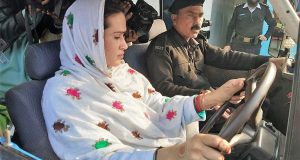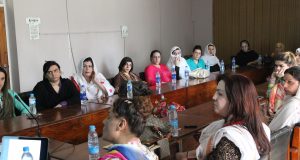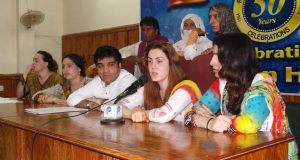PESHAWAR: A joint dialogue forum of civil society organizations was organized in Peshawar under the theme “Space for Civil Society in Pakistan. The event was organized to identify and address barriers to a healthy state-NGO relationship and will contribute to forge a strategic partnership within NGOs networks, NGOs and other stakeholders. The event emphasized on framing a code of conduct and quality standards to enhance self-regulation by NGOs, strengthen dialogue and regular interactions between NGOs and other stakeholders at all levels of national and local governance. The event was jointly organized by Civil Society Law Monitor, Pakhtunkhwa Civil Society Network, Women Action Forum, TransAction Alliance, Alliance to End Early Child and Forced Marriages, Disability Network, Rawadari Tehrek, Child Rights Movement, EVAW Alliance, FATA Commission for Human Rights, District Coordination Council, Men UNiTE, Tribal NGOs Consortium, KP Working women labor Union and National Action Coordination Group (NACG KP/FATA).
The participants of the dialogue expressed their serious concerns on the Foreign Contribution Bill aimed for regulating the organizations receiving funding. The participants of the dialogue said that such steps by the Government are in contradiction with the international commitments of Pakistan and it will further deteriorate the socio-economic miseries of the vulnerable population but will also significantly shrink space for pro-democratic institutions in Pakistan.
It was said that the civil society of Pakistan greatly value the principles of transparency & accountability and consider these elements as building blocks of a democratic society. A large number of civil society organizations actually compliment the work of state organs through various means. Millions of volunteers are working through these organizations contributing towards poverty alleviation, enhancing literacy, health services and other social sector assistance. These organizations reach out to remotest parts of the country where people are deprived of basic civic services. Additionally, the civil society has been fortifying democratic process through mobilizing masses for their participation in democratic process through a range of initiatives The participants appreciated that Govt is listening to the suggestions of civil society however in a situation where Pakistan is passing through most difficult challenges of the history it will not be wise to bring any such legislation without a comprehensive consultative process.
The representatives of the civil society said that proposed legislation will be a serious threat to the existence of small and medium size organization as all NGOs in the country does not have equal capacity and resources .All NGOs have been registered by various regulatory bodies and are already being regulated through existing laws and there is need to strengthen the existing mechanisms rather than reinventing the wheel which will further complicate the issues and pose threat to the existence of NGOs who have significantly contributed in the development of Pakistani society
The civil society actors strongly feel that Govt wants to control social organizations through coercive measures which will very negatively affect the fundamental right to the freedom of expression and provides sweeping and discriminatory powers to the state institutions which is against the fundamental freedoms and rights. The activists demanded that the draft of the proposed bill should be scrapped forthwith and civil society should be engaged to explore the need and possibility of strengthening the existing laws, regulatory and monitoring framework.
The participants of the dialogue agreed on the transparency and accountability by the state departments and civil society actors and emphasized on the needs of meaningful engagement between relevant Govt departments and civil society representatives so that concerns of both sides can be heard and addressed in a participative and inclusive way.
While speaking to the participants of the dialogue session Zar Ali Khan Chairman of FATA Commission for Human Rights said “If adopted, the law will complement an already very restrictive legislative arsenal used to silence all forms of criticism against the Govt in contradiction with international human rights instruments ratified by Pakistan and will allow authorities to ban legitimate human rights activities, though they are protected under international law”.
Khurshid Bano Chairperson of the KP Working women labor union while expressing her views said that “Human rights NGOs and defenders have been recently criminalized by the federal Govt through their very unfair media statements. I have seen the draft of the Foreign Contribution Bill. We fear that these vague terms will be used to criminalize legitimate human rights activities implemented by civil society in Pakistan”. If adopted, this bill would add to an already very restrictive legislation for civil society organizations further shrinking the space for freedom of association in the country. She added.
Qamar Naseem a civil society activists have shared a legal analysis of the INGO policy and foreign contribution bill and their legal implications and compliance requirements. He has expressed grave concern on what he calls relentless vilification and targeting of civil society organizations and intimidation of human rights defenders by extremist groups and federal Govt officials. He said that we do not have any grief for criminals and if Govt has proof that some organizations are involved in criminal activities and terrorist financing they should be dealt according to the law but maligning all organizations is not fair. We are Pakistani and we are for Pakistan.”. He said that NGOs and other civil society organization also needs to self-regulate themselves and provide required information to their registration authorities which was requirement they agreed to at their registration process.
Taimur Kamal Coordinator of Pakhtunkhwa Civil Society Network (PCSN) said that “We necessarily don’t need to fight with the Govt. We should work with the Govt and provide our input so that a win situation can be created for both” He also demanded that Tariq Fatemi’s report on NGOs which was submitted to the Prime Minister to be made public so that civil society can understand and know the concerns of the Govt.
Provoincial Chairman National Humanitarian Network (NHN) Azmatullh working with IDPS also raised concerns over the over a cumbersome government’s registration process and demand of no objection certificates for each activity despite registration and demanded that the government must reinforce its commitment to foster a dynamic, pluralistic and independent civil society and committed to meaningful and structured engagement with civil society.
Rukshanda Naz a women rights activist says that civil society has to review and must not give up their efforts. Working on Human Rights issues is our right and we are not ready to compromise on our rights. Pakistan has international obligations and it has to fulfill its commitments. Civil society has to come together if they need to survive.
The forum appreciated the efforts of state institutions to restrain violence and radicalism and said that the civil society supports government’s initiatives to end hate speech, violence and terrorism.
THE PASHTUN TIMES
 Pashtun Times Latest News
Pashtun Times Latest News





